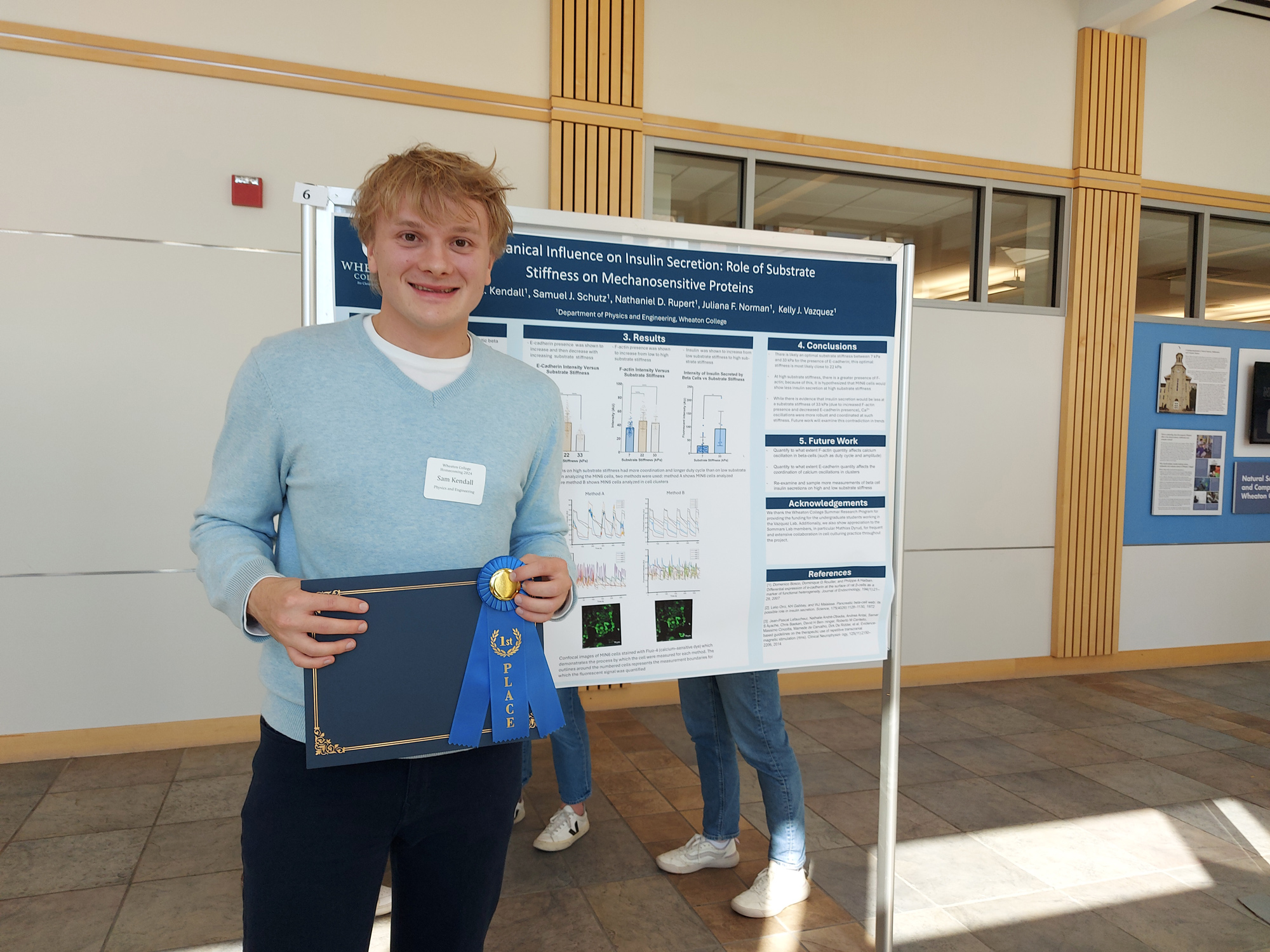Poster Session Awardees
2024 Awardees
In the fall, Undergraduate Research Fellows and Wheaton students who have conducted research at other institutions come together to showcase their research in our annual Poster Session.
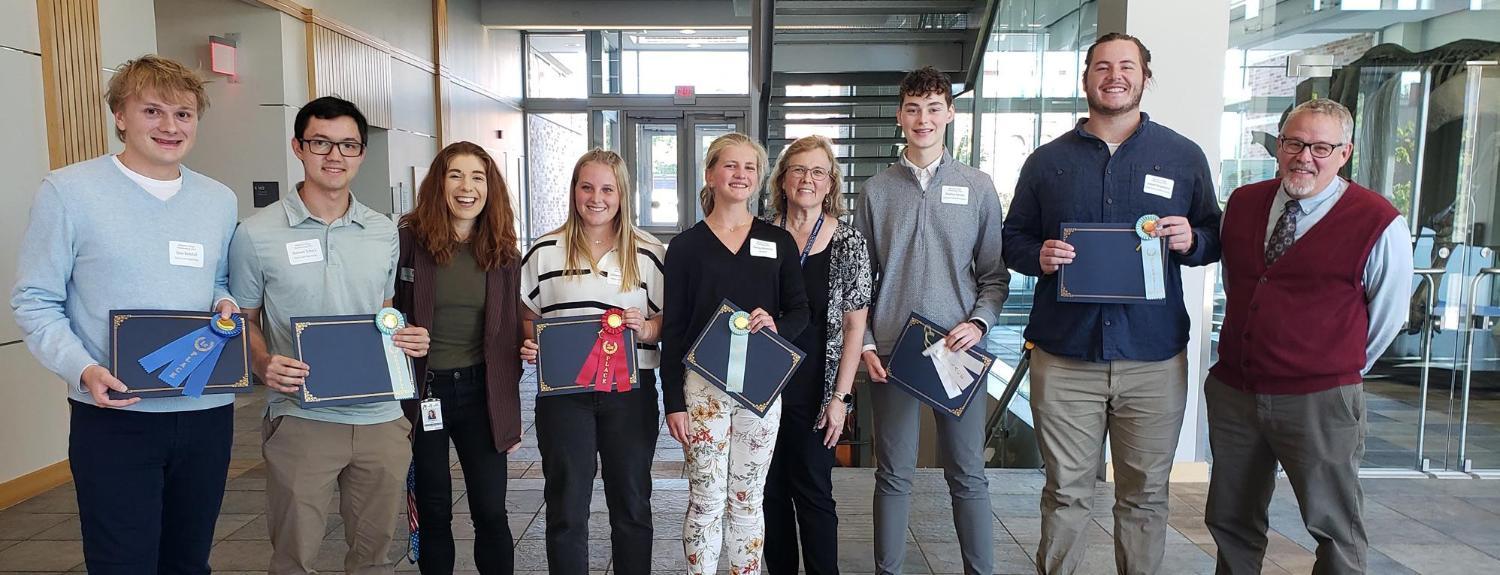
This year's top research presentations and posters, as evaluated by the Poster Session judges, are:
1st Place: Samuel Kendall
Advisor: Dr. Kelly Vazquez (Physics & Engineering Department)
Title: Biomechanical Influence on Insulin Secretion: Role of Substrate Stiffness in MIN6 Cells
Abstract: Diabetes Mellitus is a disease that occurs when pancreatic beta cells become dysfunctional in their secretion of the hormone insulin. While many aspects of the beta cells have been well studied, how the biomechanical environment affects beta cells is largely unknown. To study this, MIN6 (beta-like, insulin secreting mouse insulinoma) cells were seeded upon hydrogels of varying stiffness. The presence of the mechanosensitive proteins E-cadherin and F-actin, which play an important role in insulin secretion, was then quantified using ImageJ. Additionally, the coordination of Ca2+ oscillations within the MIN6 cells was also examined on low and high substrates. It was found that MIN6 cells on high substrate stiffness demonstrated a higher level of coordination in Ca2+ oscillations than the cells on low substrate stiffness.
Reflections on the Summer Research Program: For students in STEM, research is a crucial complement to the coursework from STEM classes. No STEM degree, in my opinion, is fully complete with at least a little scientific research. Research not only is important for the scientific community and for those that are affected by the research, but it is also very important for the students doing research. It allows the students learn even more and gives guidance on what they want to do after Wheaton (such as go into industry, grad school, etc.). Thank you for making truly one of the best summers of my life possible.
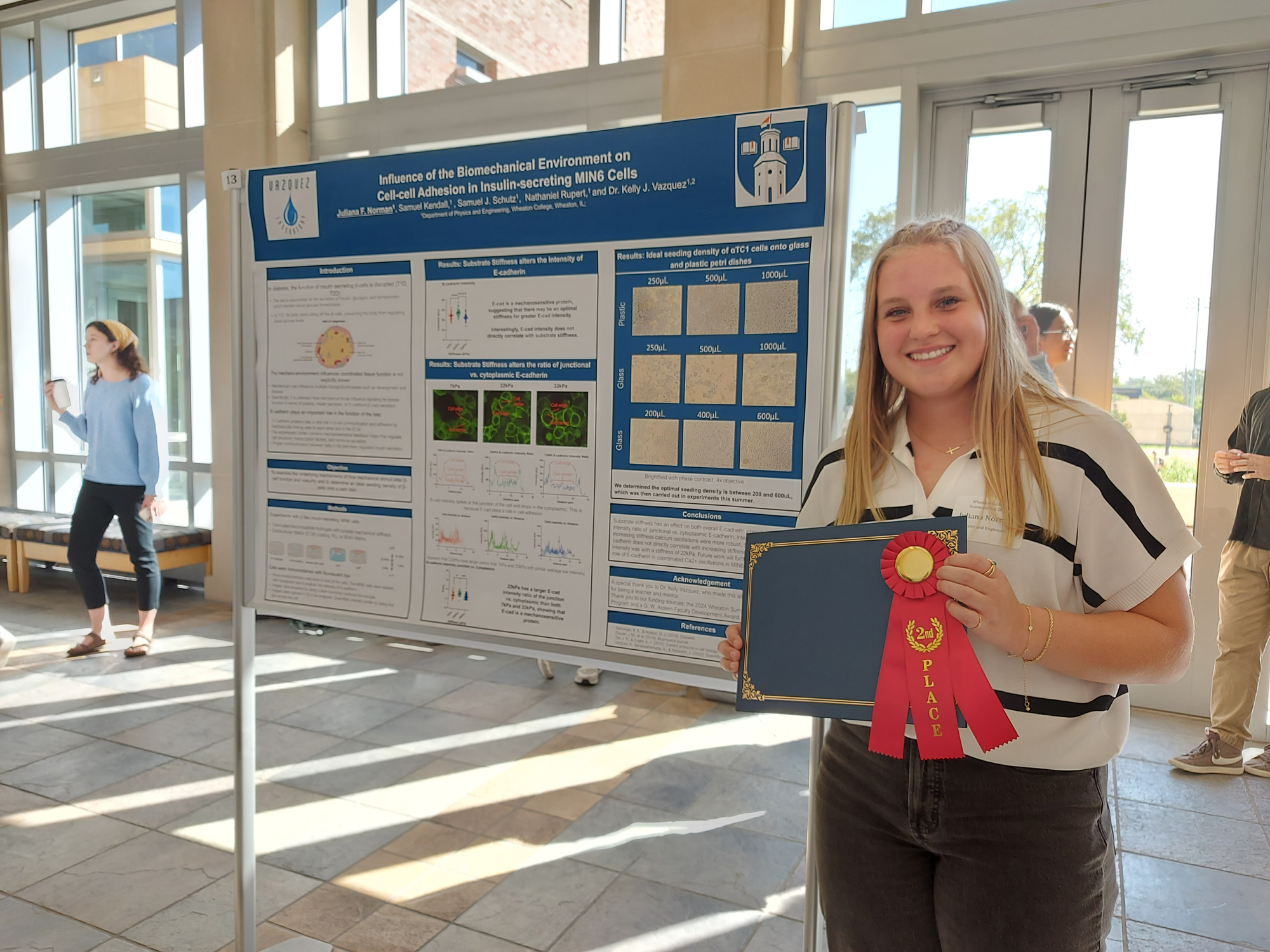
2nd Place: Juliana Norman
Advisor: Dr. Kelly Vazquez (Physics & Engineering Department)
Title: Influence of the Biomechanical Environment on Cell-cell Adhesion in Insulin-secreting MIN6 Cells
Overview: In diabetes, the function of insulin-secreting beta cells is disrupted. E-cadherin proteins play a vital role in beta cell communication and adhesion by mechanically linking cells to each other and to the extracellular matrix (ECM) surrounding the islet structure. The actomyosin cortex contains mechanosensitive feedback loops that regulate cell structure, transcription factors, and hormone secretion. Proper communication between cells in the pancreas regulates insulin secretion. The objective of this project was to examine the underlying mechanisms of how mechanical stimuli alter beta-cell function and maturity, and to determine an ideal seeding density of beta cells on a petri dish.
Reflections on summer research at Wheaton: Doing summer research at Wheaton College was wonderful all around, as I got to spend my day doing science with other students who also had a passion for science. Additionally, it reaffirmed how much I want to be a biomedical engineer.
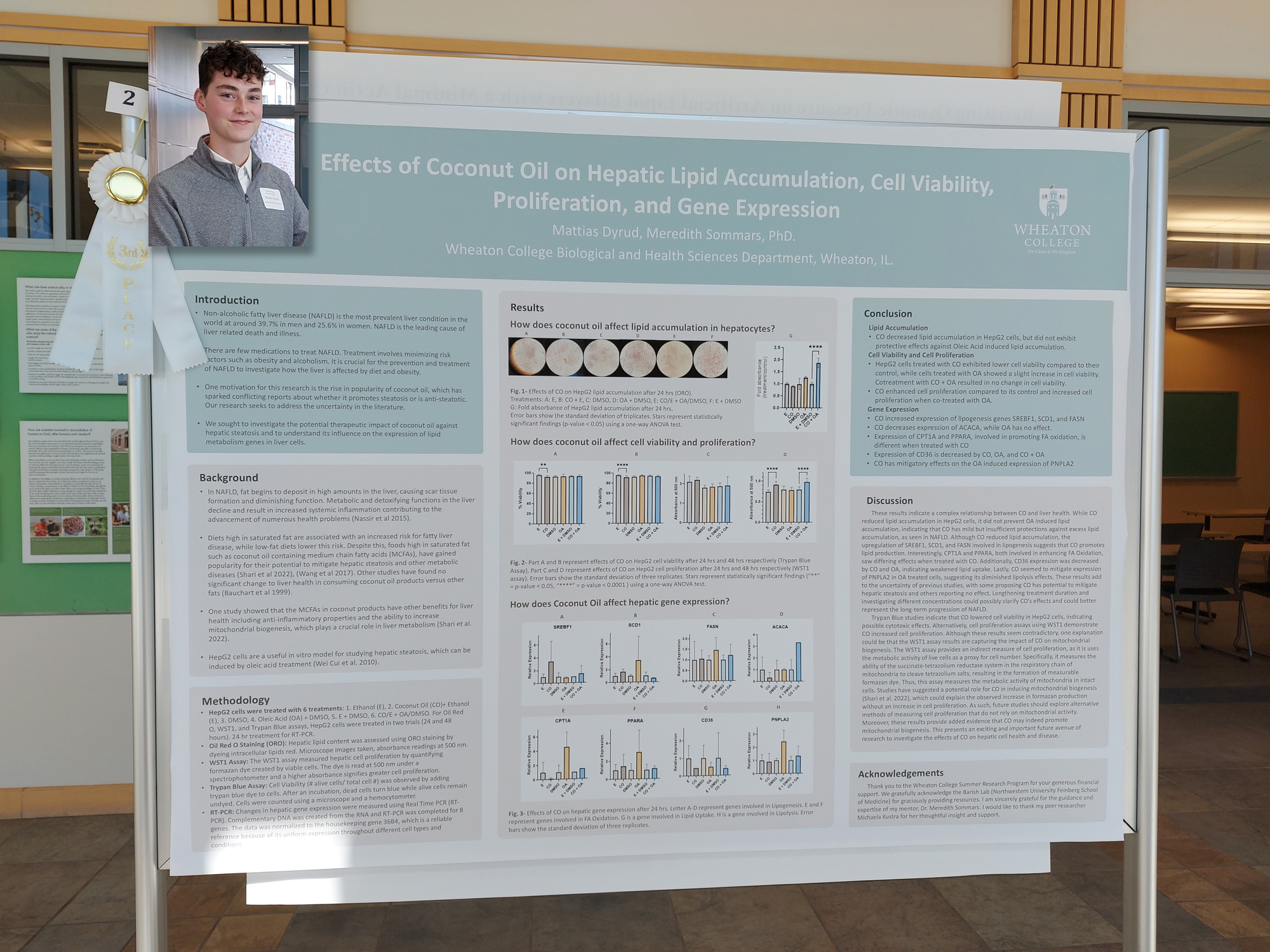
3rd Place: Mattias Dyrud
Advisor: Dr. Meredith Sommars (Biological & Health Sciences Department)
Title: Effects of Coconut Oil on Hepatic Lipid Accumulation, Cell Viability, Proliferation, and Gene Expression
Overview: Non-alcoholic fatty liver disease (NAFLD) is the most prevalent liver condition in the world at around 39.7% in men and 25.6% in women. There are few medications to treat NAFLD. Treatment involves minimizing risk factors such as obesity and alcoholism. It is crucial for the prevention and treatment of NAFLD to investigate how the liver is affected by diet and obesity. One motivation for this research is the rise in popularity of coconut oil, which has sparked conflicting reports about whether it promotes steatosis or is anti-steatotic. We sought to investigate the potential therapeutic impact of coconut oil against hepatic steatosis and to understand its influence on the expression of lipid metabolism genes in liver cells by learning how coconut oil affects lipid accumulation, cell viability, and gene expression in HepG2 cells.
Reflections on the Summer Research Program: I am deeply grateful for the Summer Research Program. The program enabled me to be involved in meaningful research and academics. I have learned so much from my team about the research process and am so thankful for this experience!
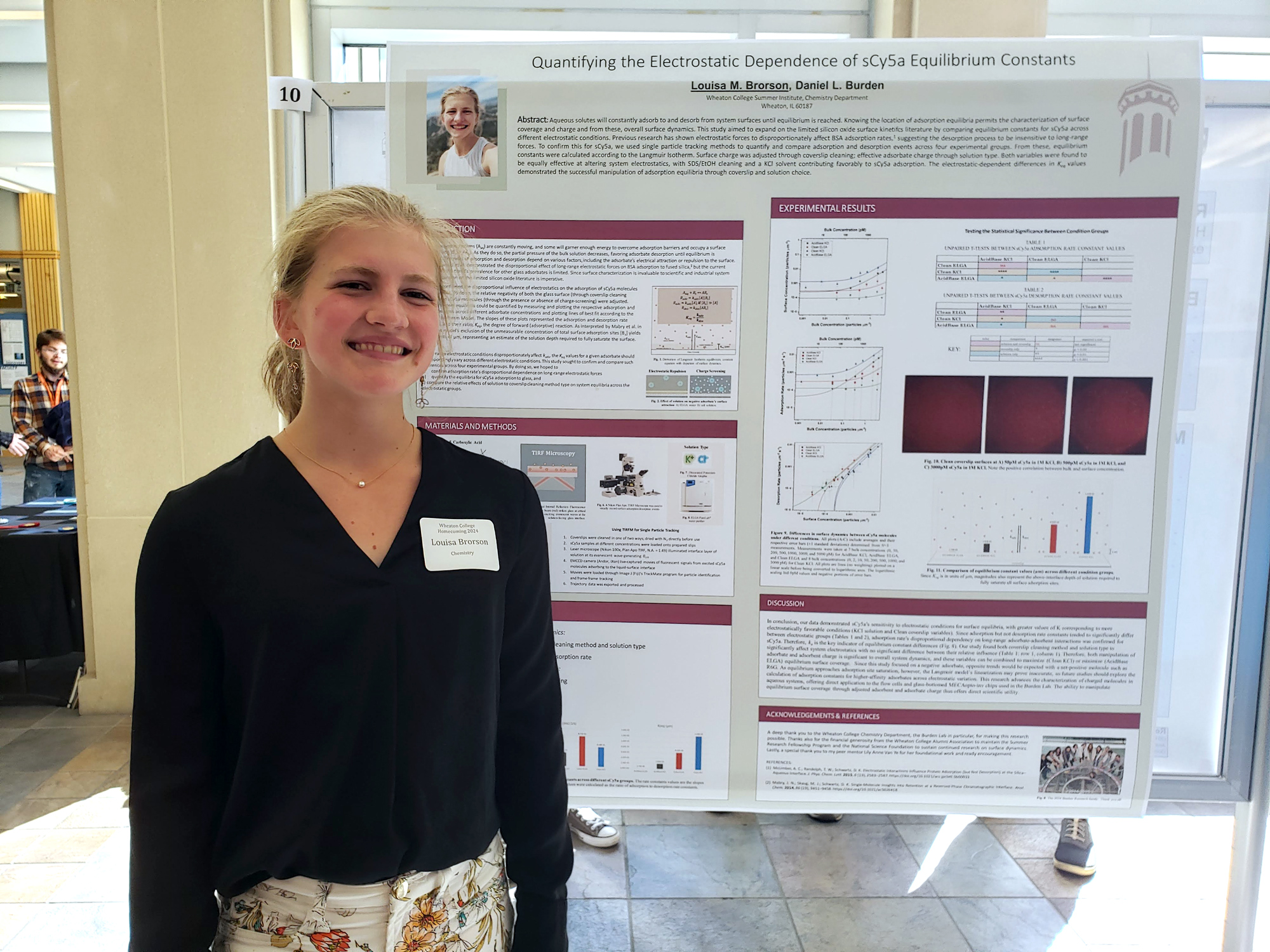
Honorable Mention: Louisa Brorson
Advisor: Dr. Daniel Burden (Chemistry Department)
Title: Quantifying the Electrostatic Dependence of sCy5a Equilibrium Constants
Abstract: Aqueous solutes will constantly adsorb to and desorb from system surfaces until equilibrium is reached. Knowing the location of adsorption equilibria permits the characterization of surface coverage and charge and from these, overall surface dynamics. This study aimed to expand on the limited silicon oxide surface kinetics literature by comparing equilibrium constants for sCy5a across different electrostatic conditions. Previous research has shown electrostatic forces to disproportionately affect BSA adsorption rates, suggesting the desorption process to be insensitive to long-range forces. To confirm this for sCy5a, we used single particle tracking methods to quantify and compare adsorption and desorption events across four experimental groups. From these, equilibrium constants were calculated according to the Langmuir Isotherm. Surface charge was adjusted through coverslip cleaning; effective adsorbate charge through solution type. Both variables were found to be equally effective at altering system electrostatics, with SDS/EtOH cleaning and a KCl solvent contributing favorably to sCy5a adsorption . The electrostatic-dependent differences in Keq values demonstrated the successful manipulation of adsorption equilibria through coverslip and solution choice.
Reflections on the Summer Research Program: This summer was incredibly memorable and proved to be enriching both to my immediate science education and my long-term growth – not only as a researcher but also as a follower of Christ.
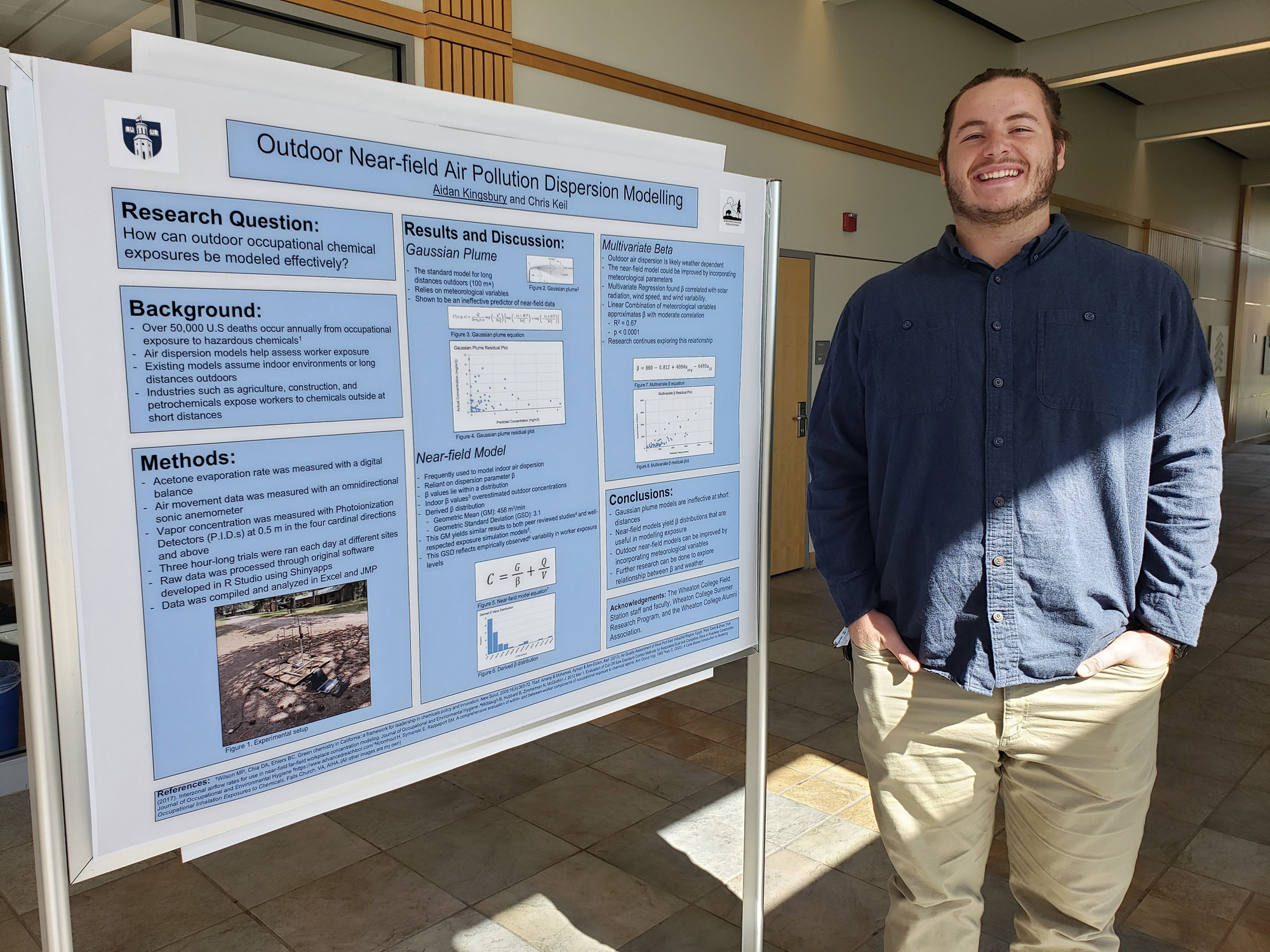
Honorable Mention: Aidan Kingsbury
Advisor: Dr. Chris Keil (Earth & Environmental Science Department)
Title: Outdoor Near-field Air Pollution Dispersion Modelling
Research Question: How can outdoor occupational chemical exposures be modeled effectively?
Background: Over 50,000 U.S. deaths occur annually from occupational exposure to hazardous chemicals. Air dispersion models help assess worker exposure. Existing models assume indoor environments or long distances outdoors. Industries such as agriculture, construction, and petrochemicals expose workers to chemicals outside at short distances.
Reflections on the Summer Research Program: This summer was invaluable experience that allowed me to get hands-on experience with the type of work that I hope to focus on after Wheaton.
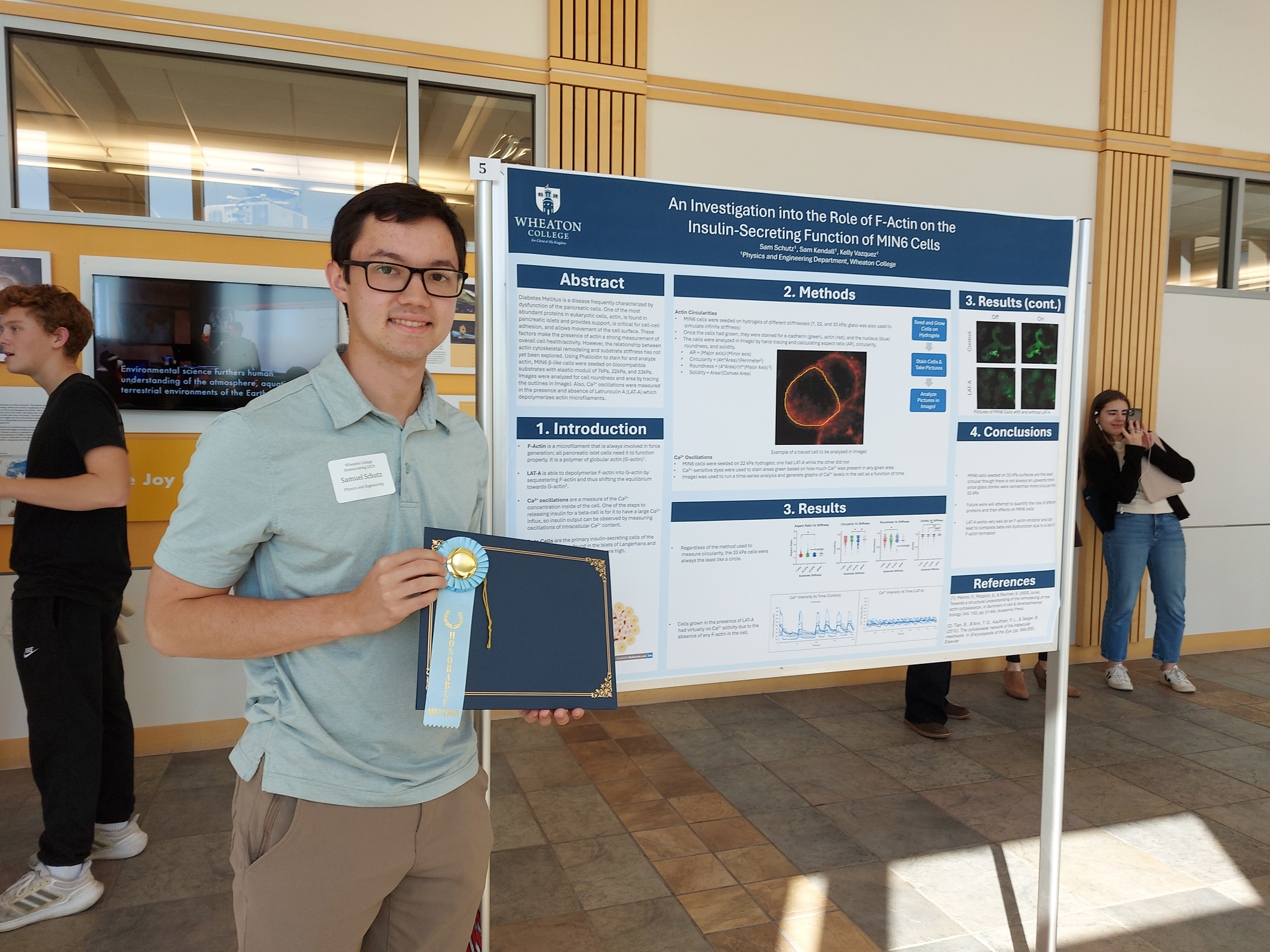
Honorable Mention: Samuel Schutz
Advisor: Dr. Kelly Vazquez (Physics & Engineering Department)
Title: An Investigation into the Role of F-Actin on the Insulin-Secreting Function of MIN6 Cells
Abstract: Diabetes Mellitus is a disease frequently characterized by dysfunction of the pancreatic cells. One of the most abundant proteins in eukaryotic cells, actin, is found in pancreatic islets and provides support, is critical for cell-cell adhesion, and allows movement of the cell surface. These factors make the presence of actin a strong measurement of overall cell health/activity. However, the relationship between actin cytoskeletal remodeling and substrate stiffness has not yet been explored. Using Phalloidin to stain for and analyze actin, MIN6 beta-like cells were seeded on biocompatible substrates with elastic moduli of 7kPa, 22kPa, and 33kPa. Images were analyzed for cell roundness and area by tracing the outlines in ImageJ. Also, Ca2+oscillations were measured in the presence and absence of Latrunculin A (LAT-A) which depolymerizes actin microfilaments.
Reflections on the Summer Research Program: This research was a combination of my interests in biology, chemistry, and engineering, and I thoroughly enjoyed it. Additionally, it will help boost my research experience when I apply for medical school.
